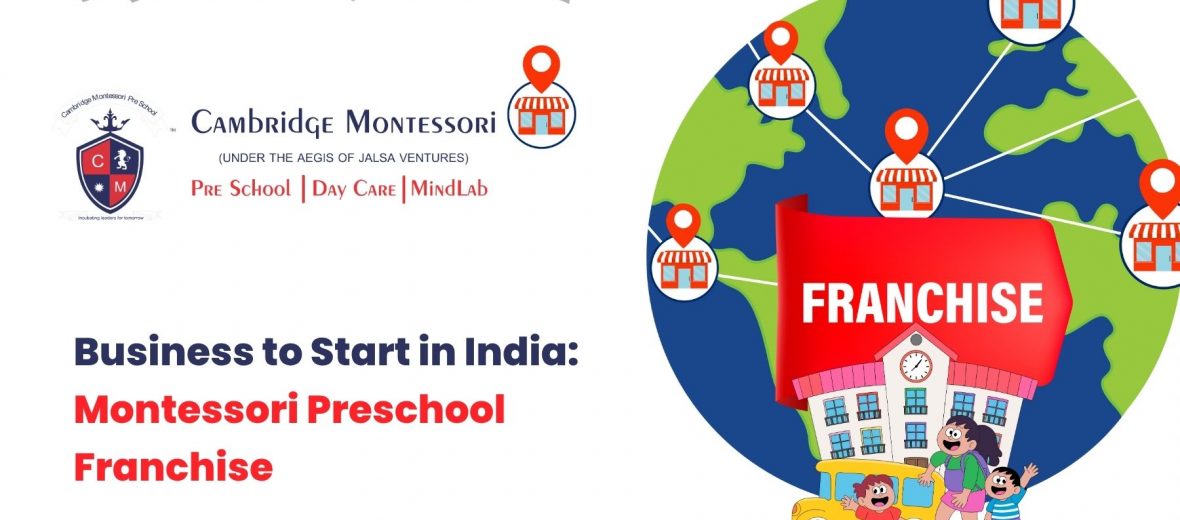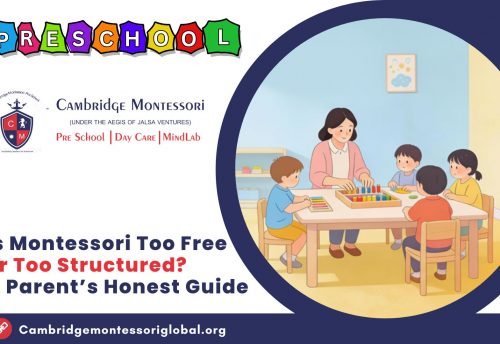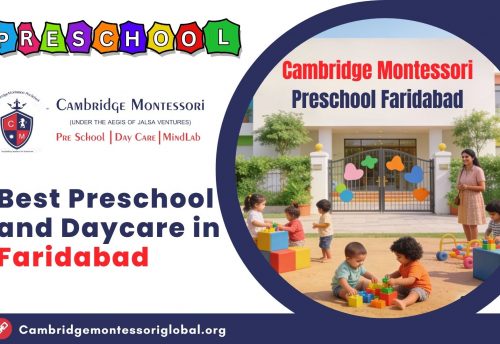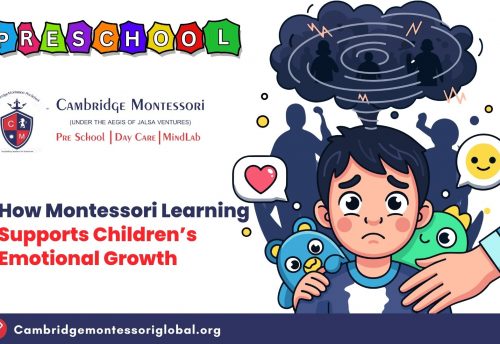
Business to Start in India: Montessori Preschool Franchise
Business to Start in India – starting a meaningful business in India means finding where demand meets purpose.
A Montessori early childhood learning center is very desirable and highly valued. Parents are seeking more than rote academic skills as urbanization and income increase. They desire schools that develop curiosity, independence, and emotional strength in children, characteristics that Montessori schools foster. This is a huge prospect for entrepreneurs, teachers, and preschool owners.
This blog will lead you through the reasons why it works, how to start or transform, and how Cambridge Montessori Preschool and Daycare can help you succeed.
Why Montessori Education Is a High-Growth Business Opportunity
The market for early childhood education in India is expanding fast. Understanding this growth is key to spotting the right business.
The IMARC Group indicates that the Indian preschool/childcare market stood at USD 4.6 billion in 2024 and is expected to grow to USD 11.0 billion by 2033 with a CAGR of about 9.5. And dual-income households push up the need to have quality education. Preschool chains that are branded and organised are on the rise, particularly in the tier-2 and tier-3 cities.
A Montessori preschool is unique, as it will guarantee emotional, social, and cognitive growth—not simply academic preparation. Business advantages are reduced capital outlay compared to full K-12 schools, stable enrollments, high potential fees, and increased parent trust.
In the case you seek to venture into a business in India today, a thriving Montessori preschool fits the description of Business to start in india.
Transforming or Starting Your Preschool: How to Get It Right
Whether you already run a daycare or preschool or want to launch one, converting to Montessori or starting fresh must be done with care.
Key steps and considerations:
- Location and Facility: Select a safe, convenient area. Montessori classrooms require free spaces and mixed-age environments.
- Curriculum & pedagogy: Use the Montessori approach that focuses on child-centered learning, practical resources, and mixed-age classes.
- Teacher training: Teacher training should be certified as a Montessori teacher. Instructors are not teachers; they are facilitators.
- Marketing & Branding: Position yourself clearly: “Premium Early Childhood Care and education with Montessori values.” Search for keywords such as ‘child care development school in India’ or ‘best early childhood education school in India.’
- Operations & admissions: Focus on parent communication, upgrades, cleanliness, and safety. Parents expect more than just lessons—they want an environment and trust.
- Conversion strategy: In the case of an existing school, emphasise the change from traditional preschool to Montessori—same values, better outcome, premium positioning.
- Use data: The organised preschool segment is increasing at an average of 9-11% CAGR.
A proper setup ensures your preschool isn’t just another center but a trusted Cambridge Montessori institution ready for long-term growth.

Why Choose “Montessori vs Traditional Preschool,” and What Differentiates You
Parents often compare Montessori vs traditional preschool. Understanding this difference helps your business stand out.
Here’s a quick comparison:
- Learning style: Montessori = child-directed learning, self-paced learning. Traditional = teacher-centered, one size fits all.
- Concentration: Montessori stresses imagination, self-sufficiency, and general development. Traditional focuses on the academic routines and exercises.
- Environment: Montessori classrooms are mixed-age, loose, and quiet. Traditions are structured and age-segmented.
- Teacher role: Montessori teachers give directions and monitor. Conventional teachers teach and examine.
- Evaluation: Montessori employs self-correction and observation. In conventional practices, tests and grades are used.
Use these different points in your brand messaging: “We are not a traditional preschool. We are a Montessori preschool where children learn to become confident, not just classroom-ready.”
Parents searching for preschool for toddlers, good preschools near me, or early childhood education centers will respond.
By making these distinctions really noticeable, you will appeal to those parents who care about quality and long-term results—and create a niche in the market.
Partnering with Cambridge Montessori: Your Success Framework
The risk of opening a school can be minimized to a large extent by a Preschool franchise or brand partner. And this is where Cambridge Montessori Preschool & Daycare becomes your ally.
Why it works:
- Curriculum and Staff: Extensive Montessori education and training of teachers.
- Support of setups: classroom design, mixed-age models, learning materials, and a specialized Montessori Lab, which is an experiential learning environment.
- Admissions support and marketing: Parent-engagement systems, tools, and templates.
- Ongoing Support: periodic training refreshers, audits, and academic mentoring.
- Brand credibility: Parents perceive a known brand as safer; this is key in early education.
- Statistics: As the national preschool market expands at almost double-digit CAGR, identification with a powerful brand increases your competitive edge.
Picking the Cambridge Montessori, you are skipping numerous start-up hurdles and setting your school up for scale and prosperity.
Conclusion
One of the most influential and well-understood businesses to start in India today is a Montessori preschool. As the demand increases, the risk and premium positioning are lower, and it provides meaning and margin. Collaborating with Cambridge Montessori provides you with an established potential for development. Go the extra mile; construct a Montessori school that transforms destinies and succeeds.
Frequently Asked Questions
Q1. What investment is required to start a Montessori preschool?
Prices depend on the location and size, but the establishment is cheaper than full schools. Cambridge Montessori offers extensive investment information to partners.
Q2. Can I convert my current preschool into a Montessori model?
Yes. Conversion can be done successfully and is more popular with the right training, curriculum change, and rebranding.
Q3. How long does it take to get teacher training and launch?
The certification of teachers and classroom organisation usually requires 4-6 months, depending on the place and number of workers.
Q4. How do I attract parents to a Montessori preschool in a competitive market?
Highlight your differentiators: child-led learning, emotional development, personalised growth. Use parent testimonials, lab photos, and free trial days.
Q5. Is the Montessori franchise model scalable to tier-2/3 cities?
Absolutely. Market data shows strong growth in non-metro cities as awareness rises and urbanization expands.



